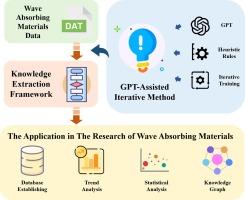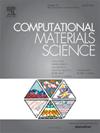在人工标注数据有限的情况下,从大量电磁波吸收材料文献中提取领域知识的 GPT 辅助迭代法
IF 3.1
3区 材料科学
Q2 MATERIALS SCIENCE, MULTIDISCIPLINARY
引用次数: 0
摘要
电磁波吸收材料研究是材料科学的重要组成部分。每年,该领域都会发表大量学术文献,其中包含重要信息。从这些文献中快速有效地提取知识是加速领域发展的关键,而基于深度学习的自动知识提取为这一挑战提供了解决方案。然而,深度学习模型通常需要大量带注释的数据进行训练,而在高度专业化的子领域中,获取这些数据既耗时又昂贵。为解决这一问题,本文提出了一种 GPT 辅助迭代训练方法,该方法仅使用 30 篇人工标注的文献摘要作为训练集,最终使命名实体识别模型(NER)的 F1 得分达到 82.94%。通过在定制数据集上与材料科学领域常用的其他大型语言模型进行比较,证明了该模型的有效性。我们以获得的 NER 模型为中心构建了一个知识提取框架,并收集了近十年来有关电磁波吸收材料的文献。提取和应用结果证明了我们框架的实用性。本文章由计算机程序翻译,如有差异,请以英文原文为准。

A GPT-assisted iterative method for extracting domain knowledge from a large volume of literature of electromagnetic wave absorbing materials with limited manually annotated data
Research on electromagnetic wave absorbing materials is an important part of materials science. Each year, a substantial amount of academic literature is published in this field, containing critical information. Rapid and effective knowledge extraction from these documents is key to accelerating field development, and automated knowledge extraction based on deep learning provides a solution to this challenge. However, deep learning models typically require extensive annotated data for training, which is time-consuming and expensive to obtain in highly specialized subfields. To address this issue, this paper presents a GPT-assisted iterative training method that uses only 30 manually annotated literature abstracts as a training set and ultimately achieves an F1 score of 82.94% for a named entity recognition model (NER). The effectiveness of this model is demonstrated by comparing with other large language models commonly used in materials science on a custom dataset. We constructed a knowledge extraction framework centered around the obtained NER model and collected literature on electromagnetic wave absorbing materials from the last decade. The extraction and application results demonstrate the practicality of our framework.
求助全文
通过发布文献求助,成功后即可免费获取论文全文。
去求助
来源期刊

Computational Materials Science
工程技术-材料科学:综合
CiteScore
6.50
自引率
6.10%
发文量
665
审稿时长
26 days
期刊介绍:
The goal of Computational Materials Science is to report on results that provide new or unique insights into, or significantly expand our understanding of, the properties of materials or phenomena associated with their design, synthesis, processing, characterization, and utilization. To be relevant to the journal, the results should be applied or applicable to specific material systems that are discussed within the submission.
 求助内容:
求助内容: 应助结果提醒方式:
应助结果提醒方式:


